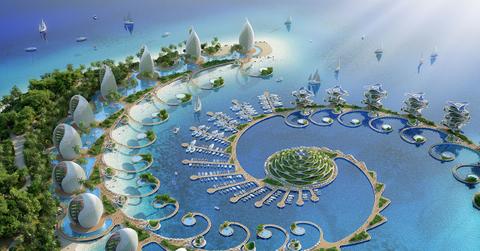Proposed Eco-Resort Aims To Greenify Tourism In The Philippines
Architect Vincent Callebaut has unveiled plans for a new eco-resort in the Philippines, which would be zero-emission and zero-waste. The extravagant plans aim to preserve and the protect the local ecology, as well as support local economy.
Updated May 26 2019, 5:51 p.m. ET
When many of us think of the Philippines, we see a tropical island paradise, complete with palm trees and clear, other-worldly blue waters. But like many natural havens, the environment is quickly deteriorating, and many of its natural wonders are in danger. In addition to natural disasters, high human activity is causing the loss of agricultural lands, deforestation, soil erosion, air and water pollution, improper disposal of solid and toxic wastes, loss of coral reefs, mismanagement and abuse of coastal resources, and overfishing.
It can be hard to justify being a tourist in a place like this, where you know your participation adds to the degradation. But one architect is on a mission to turn tourism – the area's largest economy – into a vehicle for environmental restoration and conservation.
Paris-based architect Vincent Callebaut has unveiled a proposal for a new eco-resort preserving ecology in the Philippines while respecting the area's unique ecosystems. Perched on the edge of a gorgeous cove, the imaginative resort, called Nautilus Eco-Resort, takes an approach of building that is in direct response to the environmental degradation the area is facing.
Taking inspiration from the seashell, the resort is built in a series of spirals that spin out into the water. Even the hotels and apartment towers themselves are seashell shaped, all of which adheres to the Fibonacci sequence, a symbol of balance and harmony.
But the construction is more than beautiful; the shapes actually minimize the ecological footprint, and the structures themselves are built from reused or recycled materials from the island, creating a "zero-emission, zero-waste and zero-poverty" resort.
Nautilus produces its own energy drawn from the ocean itself: The village would be built on innovative floating docks that produce thermal energy drawn from the difference in temperature between the surface and deep waters of the sea, as well as tidal energy, which captures the energy produced by the ocean's currents in hydro-turbines.
The façades and roofs combine plant walls and solar cells to control the climate, optimize natural cooling, and generate electricity. The resort produces more energy than it consumes, and the excess energy is redistributed via a mini smart-grid to the local community, making them self-sufficient, as well. Additionally, rainwater is used as much possible, and the gray water is recycled in waste stabilization ponds bordering the gardens, while organic waste is recycled into biomass.
"Self-sufficient in energy and food, it will satisfy its needs thanks to renewable energies and permaculture," the architect said. "A zero-waste policy means that it will systematically upgrade its own waste into resources. Through a co-creation process, the eco-resort will contribute to the well-being of local communities by including them in its planning, development, and operation."
But the architect is also keeping the tourist experience in mind: The towers rotate a full 360º throughout the day, chasing the sun's rays. Some of them will also rise and fall as they rotate around a central coil and some rooms, if unused, will even disappear underground.
The resort will also have an ecological education element to it. Some of the structures will house "museum-hotels," where exhibition spaces will explain the environmental and socio-cultural challenges of the area. Additionally, a scientific research center will live in the center of the lagoon, and guests will be encouraged to engage with the resident scientists, engineers and ecologists. This center is also where much of the resort's food will be grown.
"It is above all a project made to exchange and transmit ecological gestures between the natives and the newcomers. It will ask volunteer ecotourists to clean the washed-up plastic waste from beaches, put in place cradle to cradle recycling schemes, learn permaculture, protect coral crops, restore reasonable fishing, which will allow nature to regenerate, or strengthen natural protection against flooding," the architects explained at Architect Magazine. "Finally, it will encourage respect for the archipelago's different cultures."
